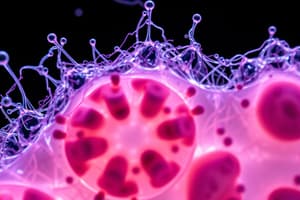Podcast
Questions and Answers
Who demonstrated that the blood circulates and the heart pumps?
Who demonstrated that the blood circulates and the heart pumps?
William Harvey
What did Robert Hooke use the word 'cell' to describe?
What did Robert Hooke use the word 'cell' to describe?
Compartments he sees in cork under the microscope
Francesco Redi showed that decaying meat protected from flies does spontaneously produce maggots.
Francesco Redi showed that decaying meat protected from flies does spontaneously produce maggots.
False (B)
Who is known for initiating the Binomial System of naming organisms?
Who is known for initiating the Binomial System of naming organisms?
What did Jean Baptiste de Lamarck support?
What did Jean Baptiste de Lamarck support?
Who founded the science of vertebrate paleontology?
Who founded the science of vertebrate paleontology?
Who stated that plants are made up of cells?
Who stated that plants are made up of cells?
What concept did Rudolph Virchow contribute to cell biology?
What concept did Rudolph Virchow contribute to cell biology?
Who presented the evidence for natural selection guiding the evolutionary process?
Who presented the evidence for natural selection guiding the evolutionary process?
What significant discovery did Louis Pasteur make?
What significant discovery did Louis Pasteur make?
What did George Johanne Mendel propose based on his experiments with garden peas?
What did George Johanne Mendel propose based on his experiments with garden peas?
What did Robert Koch establish in the field of microbiology?
What did Robert Koch establish in the field of microbiology?
Who discovered ABO blood types?
Who discovered ABO blood types?
What antibiotic did Sir Alexander Fleming discover from a fungus?
What antibiotic did Sir Alexander Fleming discover from a fungus?
Who founded the science of Ethology?
Who founded the science of Ethology?
Flashcards are hidden until you start studying
Study Notes
Key Contributions in the History of Biology
- William Harvey (1628, Britain): Demonstrated the circulation of blood and the pumping action of the heart.
- Robert Hooke (1665, Britain): Coined the term "cell" after observing compartments in cork through a microscope.
- Francesco Redi (1668, Italy): Conducted experiments showing that decaying meat kept away from flies does not produce maggots, challenging spontaneous generation.
- Antonie Van Leeuwenhoek (1673, Holland): First to observe living microorganisms using a microscope, laying the foundation for microbiology.
- Carolus Linnaeus (1735, Sweden): Established the Binomial Nomenclature system for naming organisms, crucial for biological classification.
- Jean Baptiste de Lamarck (1809, France): Proposed early theories of evolution, suggesting the inheritance of acquired characteristics.
- Georges Cuvier (1825, France): Founded vertebrate paleontology, demonstrating the relationship between fossils and living organisms.
- Matthias Jacob Schleiden (1838, Germany): Asserted that all plants are composed of cells, contributing to cell theory.
- Theodore Schwann (1839, Germany): Stated that animals are also made of cells, further advancing cell theory.
- Claude Bernard (1851, France): Introduced the concept of a stable internal environment in organisms, earning him the title "Father of Animal Parasitology."
- Rudolf Virchow (1858, Germany): Proposed that all cells arise from pre-existing cells, encapsulated in the phrase "Omnis cellula e cellula."
- Charles Darwin (1858, Britain): Presented evidence for natural selection as a driving force of evolution.
- Alfred R. Wallace (1858, Britain): Independently developed theories paralleling Darwin's on evolution and introduced the six zoogeographic realms.
- Louis Pasteur (1865, France): Disproved spontaneous generation and demonstrated that infections are caused by bacteria; developed vaccines for rabies and anthrax.
- Gregor Mendel (1866, Austria): Laid the groundwork for genetics with his experiments on pea plants, formulating basic laws of inheritance.
- Robert Koch (1882, Germany): Established the Germ Theory of Disease; created foundational techniques still used in bacteriology.
- Karl Landsteiner (1903, Austria): Discovered human blood types (ABO system), important for transfusion medicine.
- Sir Alexander Fleming (1929, Britain): Discovered penicillin from mold, revolutionizing antibiotic treatment.
- Konrad Lorenz (1937, Austria): Founded the field of Ethology, focusing on animal behavior and its ecological significance.
Studying That Suits You
Use AI to generate personalized quizzes and flashcards to suit your learning preferences.



